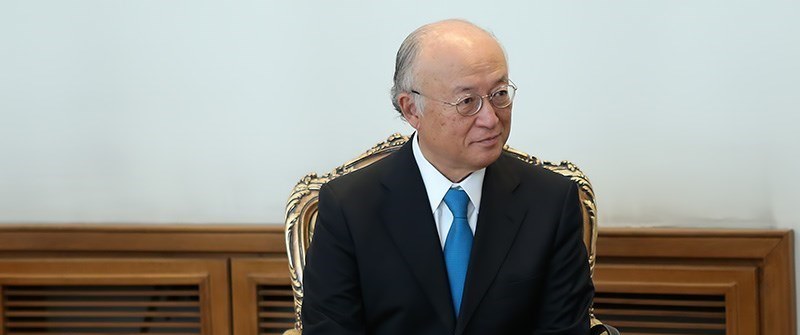 International Atomic Energy Agency director general Yukiya Amano[/caption]
International Atomic Energy Agency director general Yukiya Amano[/caption]Little Progress in Talks During Past Months, Yukiya Amano Says
MUNICH, Germany�Talks between Iran and the United Nations� atomic agency have yielded no significant progress in recent months, although the two sides agreed to step up senior-level dialogue, the agency�s head said this weekend.
Yukiya Amano, director general of the International Atomic Energy Agency, met Iranian Foreign Minister Javad Zarif on Saturday on the sidelines of the Munich Security Conference annual meeting.
Iran has been�in talks with the IAEA�for years on past work the West suspects Iran carried out as part of a nuclear weapons program. Iran had promised to step up cooperation with the agency in November 2013, at the same time as the country intensified a separate�set of talks with six world powers�aimed at setting limits on Tehran�s future nuclear activities.
After some initial progress, Iran has offered little new information to the IAEA since May.
�There has not been significant progress,� Mr. Amano told The Wall Street Journal. �Much more needs to be done� to clarify outstanding issues.
Asked if Mr. Zarif promised to step up the pace of cooperation, Mr. Amano said that wasn�t yet clear.
�He listened to me and he agreed to further intensify the dialogue,� he said. �He didn�t say no.�
The IAEA produces quarterly reports on its negotiations with Iran and the next one is due to be sent out to member states over the next couple of weeks.
Mr. Amano said Mr. Zarif did agree that senior Iranian and IAEA officials should �interact more intensively and more frequently.�
He said there should be another top-level meeting between the two sides in the coming weeks, although no date is yet set.
In a November 2011 report, the IAEA raised 12 areas of concern about Iran�s past nuclear work. Much of the report focused on work that Tehran did more than a decade ago.
Iran has partially addressed one of those issues and in May it promised to answer the agency�s questions within three months on two further areas. Mr. Amano confirmed there had still been no real progress on those two issues and that Tehran has still not picked new areas it will discuss in future.
Iran has repeatedly stymied IAEA requests for access to leading scientists, documents and military sites where Western officials say nuclear work may have been carried out. Iran has always denied it had a military nuclear program.
U.S. and other senior Western officials have previously said Iran must answer some of the key questions about its past work if it hopes to convince the international community its current nuclear activities are purely peaceful. However, while Western officials once demanded progress in talks with the IAEA before concluding a final nuclear deal, that precondition seems to have faded.
Mr. Amano said that for Iran, failing to address the issues thrown up by its past work �is not an option.�
The IAEA chief said he still sensed political determination to strike a deal on the broader nuclear talks between Iran and the six powers. The IAEA isn�t directly involved in those talks, in which Tehran negotiates with the U.S., the U.K., Russia, China, Germany and France.
�Now, we sense there is a political will. They have covered various issues and they have disagreement in some areas as I understand it,� he said. �So all the elements are there.�
Iran and the six powers have set a late March deadline to complete the framework of a final deal. They have placed a new June 30 deadline for sealing a detailed final nuclear accord.
An agreement would gradually lift tight international sanctions on Tehran in exchange for limiting Iran�s future nuclear activities.
By The Wall Street Journal










